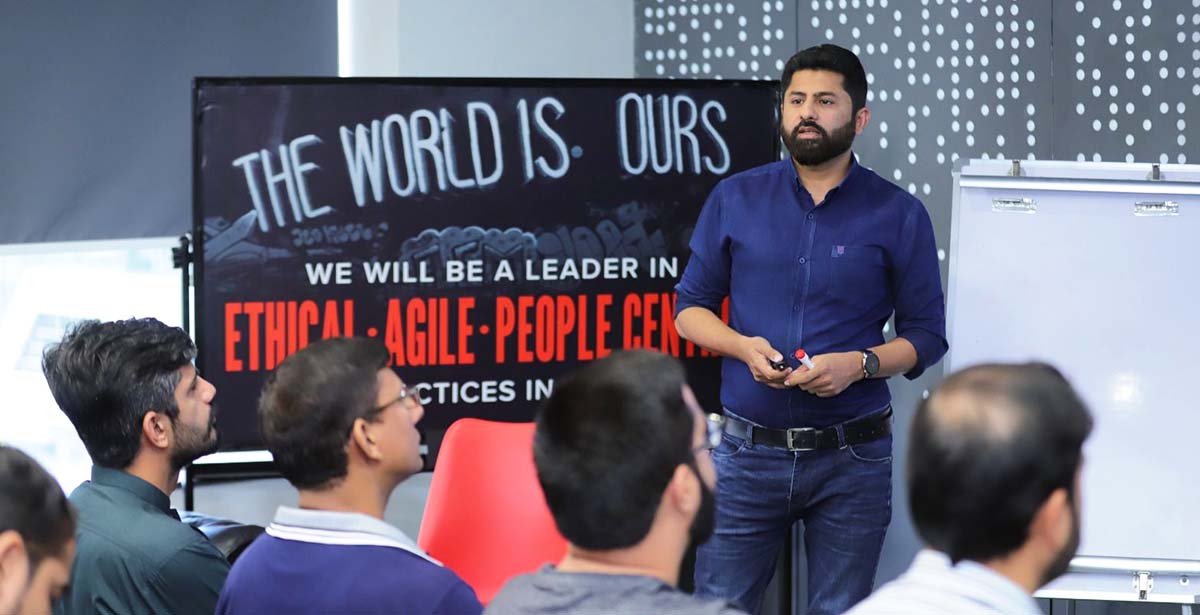An Interview with Sir Carr – The Anti-Flat Company Culture Symbol

Perched at a highly visible corner is Sir Carr – a reminder for DPL Rebels to maintain a flat company culture.
Head to toe in black, his style is inspired by the nation’s former colonial overlords. However, attire isn’t the only aspect Sir Carr has embraced.
His thoughts and actions aim to ensure that no one forgets the colonial mentality – ever. Unfortunately, the Rebels at DPL continue thwarting his efforts to return to a darker era.
Regardless, Sir Carr is an integral part of DPL and a figure we can’t but be curious about. Which is why he is the star of the interview below.
Good morning, Sir Carr. Let’s…
[Gasps] Did you see that?! The new intern just called their CEO by name! I mean where have honorifics disappeared to in a professional environment?! I really dislike this flat company culture that DPL seems to be pushing on everyone joining its team.
But isn’t having a flat company culture beneficial?
I wonder where you heard such rubbish to be honest. Oh, maybe you don’t understand this term.
Let me explain it for you. A flat organization is one where there are few to no levels of management between staff and executives. In other words, [visibly shudders] there are no hierarchies or many managers supervising employees.
Because of this, employees rely more on themselves and apparently “master autonomy and self-realization.”
It honestly sounds like DPL is onto something beneficial though.
Tsk, I just explained what a flat company culture to you and you still continue to misunderstand.
Managers aren’t there to supervise the workforce. Instead, it’s employees themselves who are involved in the decision-making. In some cases, they are encouraged to be free when thinking and acting. That way, they can take the decisions themselves.
And to make things worse, DPL has adopted holacracy. This means power is distributed through roles and roles to – get this – “best serve the organization’s purpose.”
… Moving on from flat company culture.
Sir Carr, what is it that you truly stand for?
So, these Rebels refer to me as a symbol of authority, unquestioning compliance, and mental servitude. While I know they’re trying to sound offensive, there really is nothing bad about this.
Look – as a point of authority, I assign what I want to who I want. All the decision-making lies with me; everyone else is an implementer. While some say this is a dictatorial form of leadership, it actually ensures everyone is under pressure to perform.
Sure we had some problems with employee productivity and lack of employee loyalty, but at least my position as a boss wasn’t compromised. In fact, everyone did as they were precisely told.
But wouldn’t blindly following orders impact individuals’ creativity?
I know what’s best for my people, even if I don’t know as much or am up to date with the latest trends. There’s a reason I’m the boss, after all.
Moreover, I make sure to provide feedback to guide my employees every time they make a mistake. They need to know what went wrong, especially in front of everyone else.
Unfortunately, not everyone appreciates this. Some say it affects morale and causes turnover. But I honestly don’t want people who can’t handle criticism.
Besides – between the both of us – creative individuals are dangerous. If I support them, they’ll gain more power and control. Imagine having one of them replace me one day. No! I won’t let this happen!
Okay [cough] let’s change the course of this interview a little.
Let’s talk about you now, Sir Carr. What molded you into the character you currently are?
Finally, a good question! As a proud South Asian, I believe that I’m the product of the events that happened within my region.
History has taught me many things, including the need to have power and flaunt it. This reduces the risk of mistakes altogether since I am hardly wrong – ever. If anyone wishes to voice a different opinion, they can do so through their managers. They’ll email me for an appointment to discuss the matter further.
I should add that the present is equally responsible for some of my best qualities.
Look around you in the region’s software development industry. The majority of successful businesses have hierarchies and follow a bureaucratic leadership model. Not everyone is like them [points at the Rebels at the front].
I noticed one thing about you, and I wish to ask you about it, if I may.
Absolutely! I have been quite open with you and will continue to do so.
Thank you, Sir Carr. So, I noticed that you have money in your middle section. Is this some power play?
[Hesitates for the first time in this interview] Oh that.
Umm, these are just tokens of appreciation from my fans. When the sunlight hits me at a certain angle, I believe I look so majestic that everyone just hands me these 50-rupee notes and I…
[DPL Rebels begin laughing loudly]
Ignore them, please. Don’t mistake these for bribes. Instead, they’re forms of flattery and praise for being the true boss around here.
DPL Rebel: Don’t believe him for a second! These notes are the penalties we pay for using honorifics like “sir” at the company. Our culture has been against hierarchies and anything that can support them, including the simple act of using honorifics when addressing seniors.
Considering that your last answer was a lie, Sir Carr, are any of your previous answers true?
Yes, oh yes, oh yes. It’s just embarrassing to admit that I collect penalties. I have an ego, you know, and I don’t like how they downplay it.
Well, I guess that’s it for today then. Thank you for your time.
Hope that you don’t have to cross paths with Sir Carr any time soon.
And if you’re interested in joining the counterculture movement at DPL, simply check our careers page.
We’re always on the hunt for talented individuals seeking opportunities to grow in a flat company culture. And not only professionally, but also personally.
Till next time, Rebels’ Desk is over and out.




